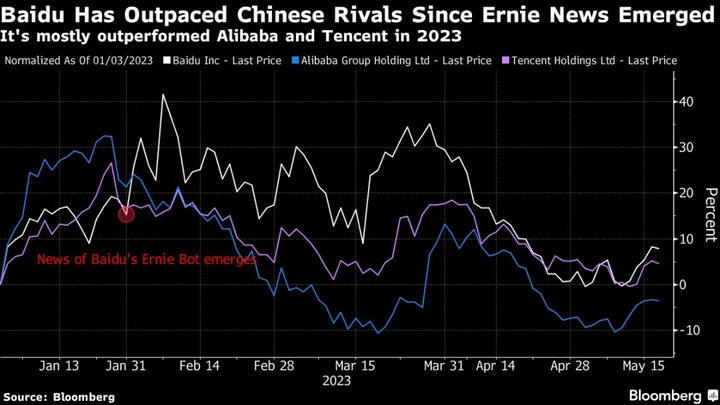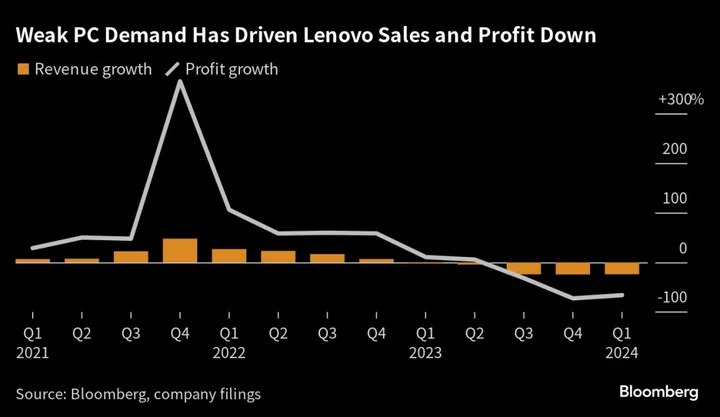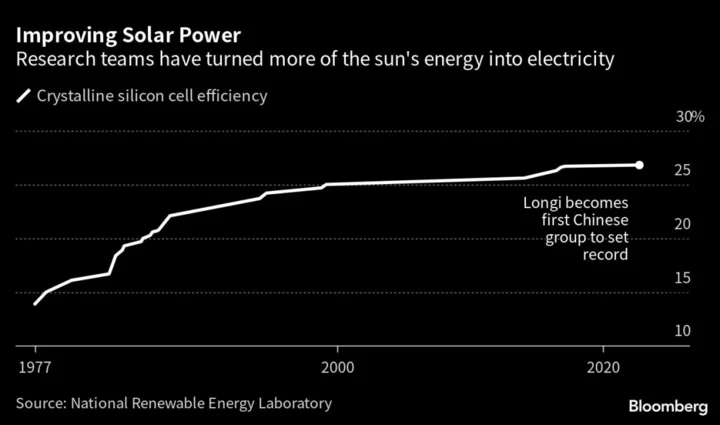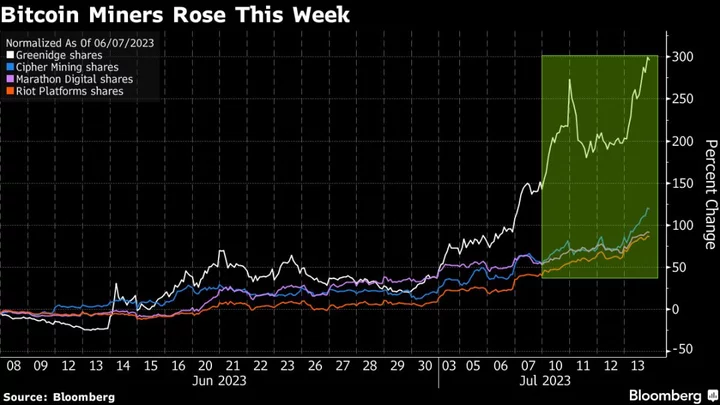Tencent Holdings Ltd. grew revenue at its fastest pace in more than a year, fueling hopes the world’s largest online gaming and content arena will begin to accelerate after China’s post-pandemic reopening.
Revenue rose 11% to almost 150 billion yuan ($21.4 billion) for the three months ended March, compared with the 146.29 billion yuan average forecast. Net income was 25.8 billion yuan, versus the 28.9 billion yuan projected.
China’s most valuable company barely grew its topline in 2022, when regulatory crackdowns and Covid restrictions choked off consumer and corporate spending. The return to robust growth suggests mainstay internet businesses like advertising and gaming are emerging from their historic trough, while big tech firms continue to push aggressive cost cuts to endure an uncertain global macroeconomic environment.
“Tencent remains one of the most uniquely positioned China internet companies given its unrivaled WeChat ecosystem, leadership in games and new growth drivers across video account and fintech,” Goldman Sachs analyst Ronald Keung wrote in a note ahead of the results.
Tencent and peers like Alibaba Group Holding Ltd., JD.com Inc. and Baidu Inc. are watched for clues to the health of Chinese business sentiment and consumption. JD.com barely grew revenue during the March quarter, but the more advertising-dependent search leader Baidu returned to double-digit growth. The WeChat operator itself had only just resumed growing revenue in the December quarter after a few months of decline.
Investors have flip-flopped on Chinese tech stocks this year, first buying into the belief that Beijing would rally the giant sector to boost the world’s No. 2 economy in 2023. But cheerleading by officials didn’t translate into concrete policy and signs have since grown that the country’s nascent economic recovery may already be petering out.
Tencent faces more specific challenges as well. It has yet to find its next big gaming success in China, after Honor of Kings and Peacekeeper Elite cemented its lead in the pre-Covid era. The company aims to fill its long-empty pipeline in 2023 with hits like Valorant after Beijing’s censors resumed licensing approvals last year. Such new launches will test a rapidly saturating domestic market, where younger players are increasingly drawn to up-and-comers like anime specialist Mihoyo.
What Bloomberg Intelligence Says
Tencent’s domestic gaming business is likely to show some seasonal strength in 1Q, though the fundamental outlook for China’s gaming market remains weak. Cloud computing is also expected to remain weak. Rebounding fintech sales, combined with strengthening advertising and rising short-video demand should drive Tencent’s revenue though the next two quarters, though we expect the rebound to be short-lived, given broader macro risks and a weak outlook for domestic games. Cost pressures will likely rise through 2023 as Tencent invests in AI and games, potentially capping the scope for further margin improvement. We don’t expect Tencent to generate any meaningful revenue from AI this year.
- Robert Lea and Tiffany Tam, analysts
Click here for the research.
Globally, Tencent’s appetite for content isn’t waning even at a time it’s divesting assets and spending more judiciously at home. The world’s largest games publisher has over the past years ramped up its effort to acquire mid-sized games studios in places from Europe to Japan, while growing its stakes in established names such as Ubisoft Entertainment SA. In March, Tencent debuted its evergreen Honor of Kings in Brazil, paving the way for a global roll-out.
Investors will however keep a close watch on content costs, particularly as Tencent builds out its cloud service and begins to integrate AI across its portfolio. Just this week, the WeChat operator announced a price cut of some of its core cloud products by as much as 40%, following a similar move by nemesis Alibaba.
Tencent is hoping to integrate artificial intelligence capabilities across its suite of products from WeChat to online media, calling the technology a “growth multiplier.”
ChatGPT, now a global phenomenon, triggered a race among Chinese tech firms to catch up. But the Shenzhen-based firm appears to lag behind rivals like Alibaba and Baidu, both of which have announced ChatGPT-style platforms and triggered a frenzy among investors.
As the backbone of Tencent’s online content and commerce empire, WeChat has been shouldering more of the burden for monetization while other businesses falter. Its fledgling short-video feed generated more than 1 billion yuan of ad sales in the final quarter of 2022 despite intensifying competition from rivals like ByteDance Ltd.









